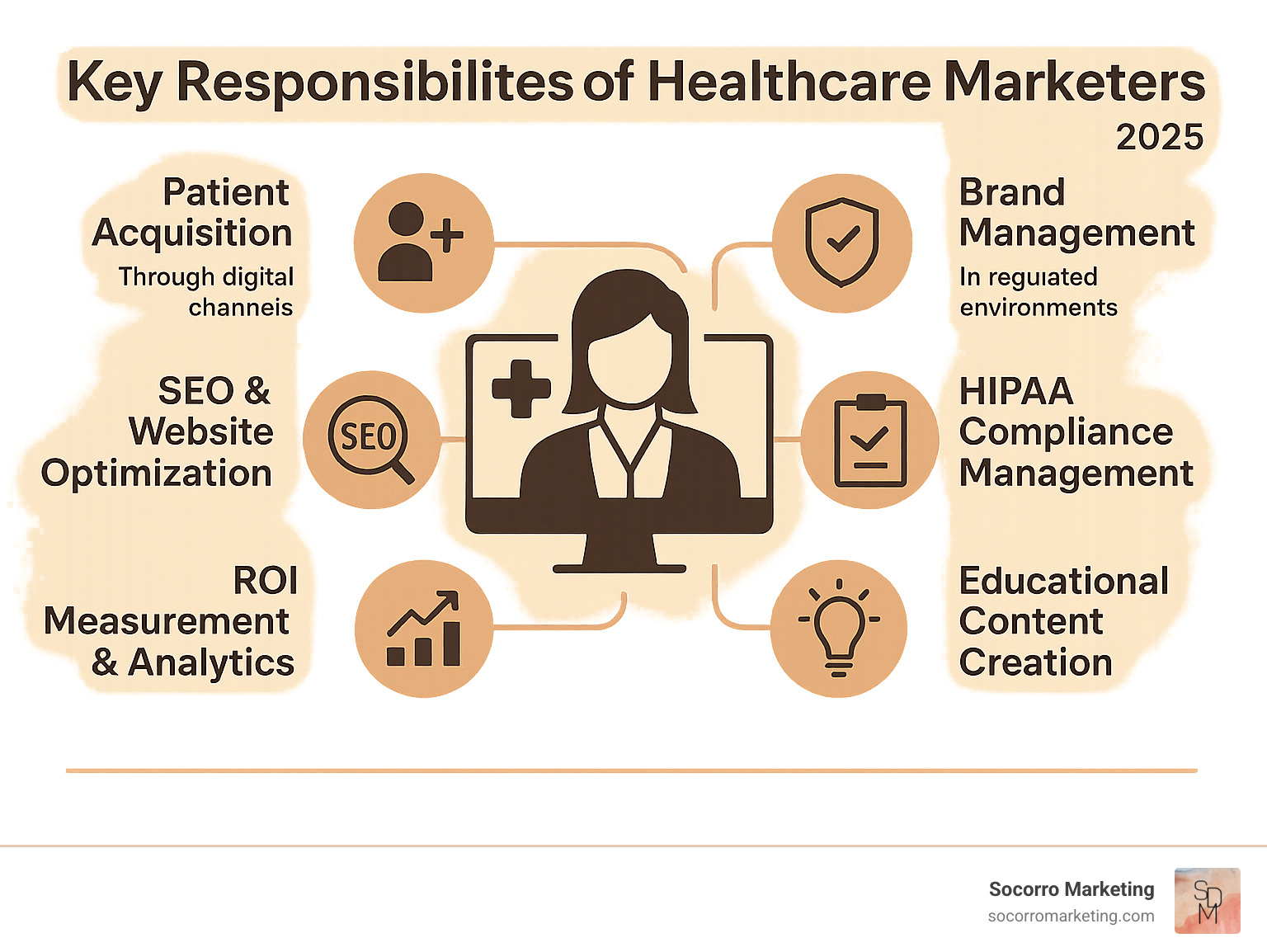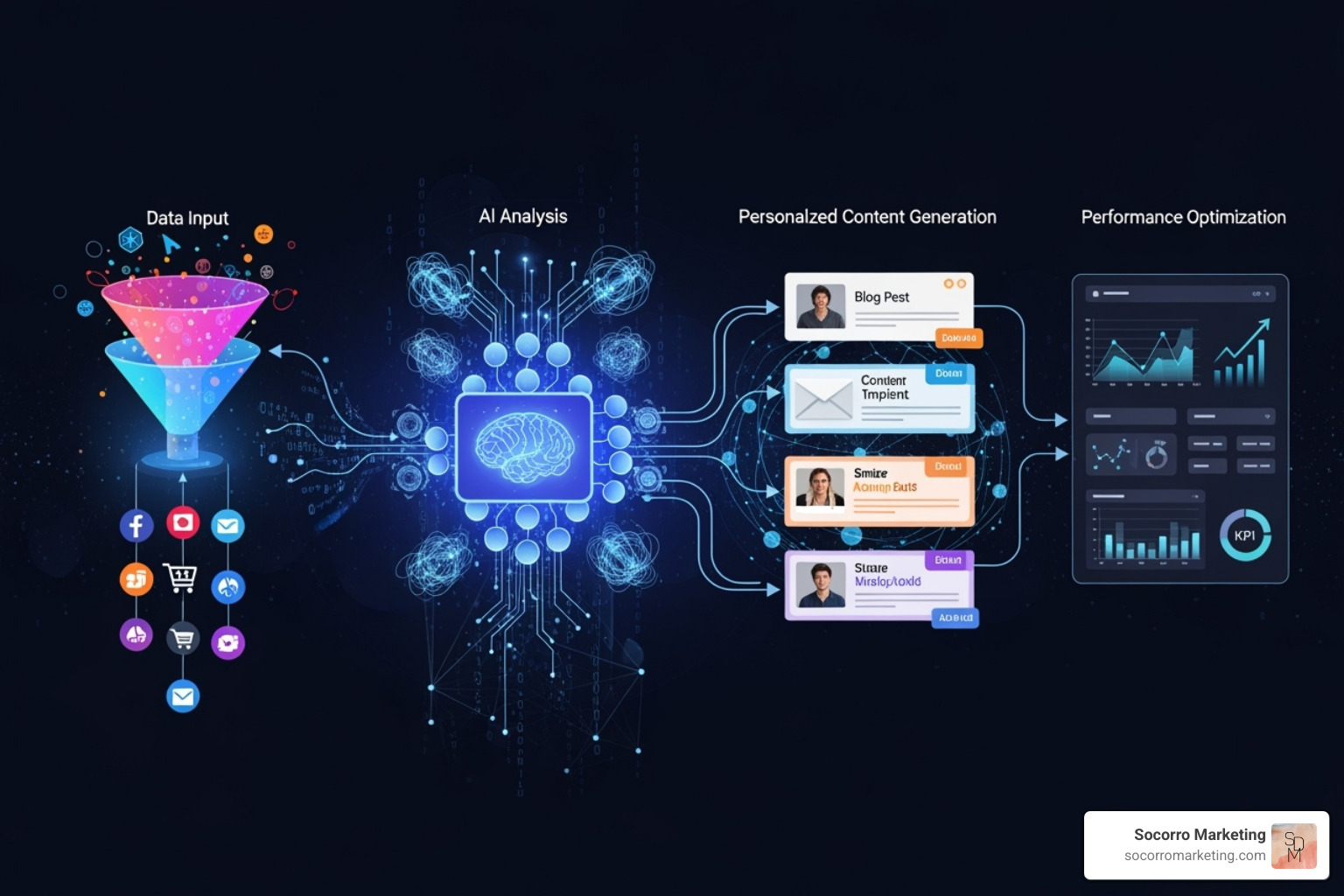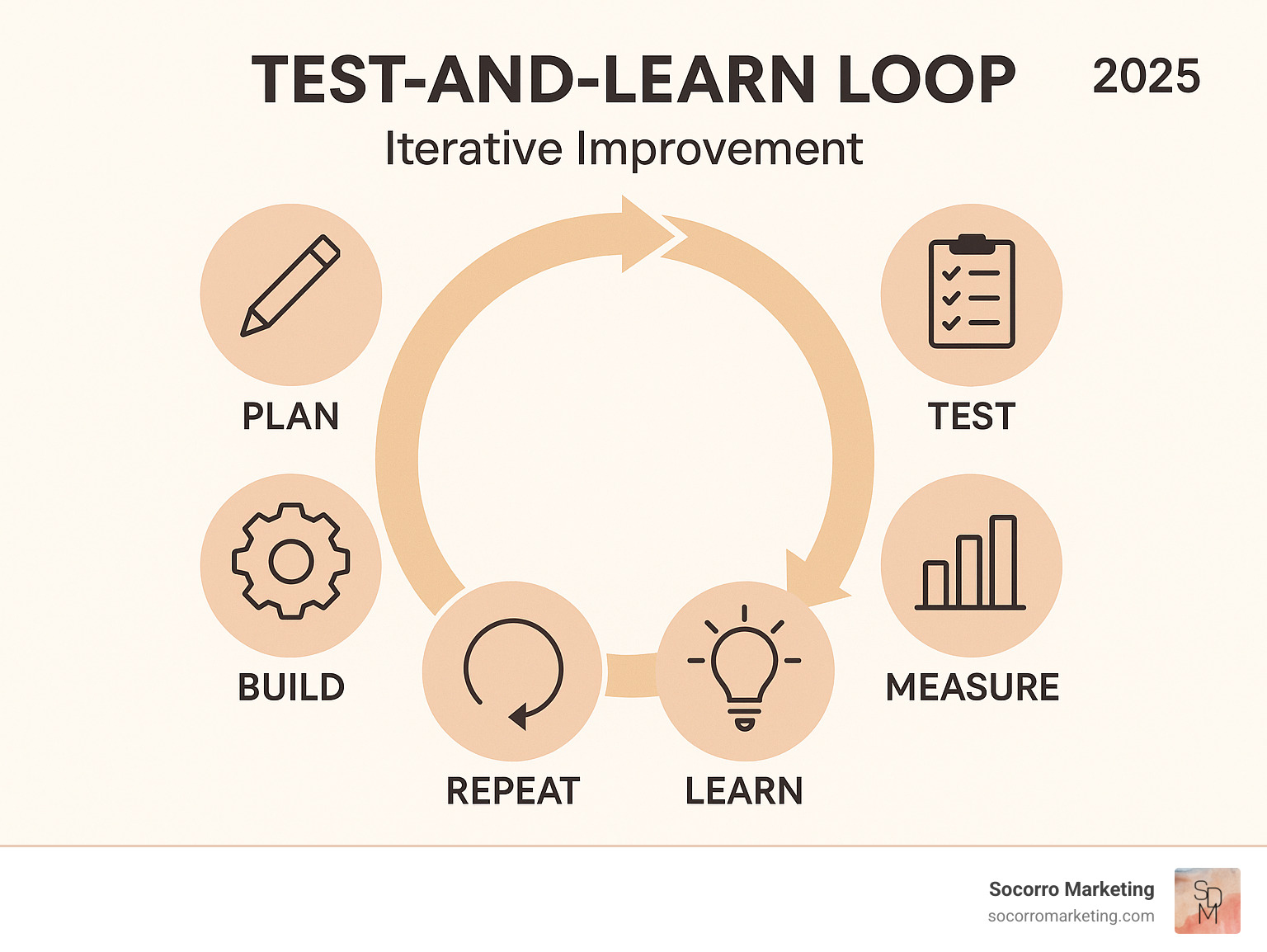Healthcare marketers are strategic professionals who connect medical expertise with patient needs, driving growth through digital channels while ensuring trust and compliance. Their role is defined by several key responsibilities:
Today's healthcare consumers are more empowered than ever, demanding the same seamless experiences they receive from retail brands. This shift presents a major opportunity: providers who improve their consumer experience can see revenue increases of up to 20% over five years. Capturing this value requires healthcare marketers who grasp both clinical realities and digital strategy.
The challenge is that many patients now research, read reviews, and make decisions online long before contacting a practice. To succeed, healthcare marketers must master SEO, paid advertising, and AI-powered personalization, all while navigating strict privacy regulations.
I'm Grace Ascione, a registered nurse with an MBA who moved from clinical care to healthcare marketing over 15 years ago. My background helps me translate clinical expertise into compelling patient experiences that drive measurable growth.

Quick healthcare marketers terms:
The era of simple newspaper ads is over. Today's healthcare marketers operate in a world where patients research symptoms on Google, read reviews before choosing a provider, and expect seamless digital experiences. This isn't just about swapping print for digital; it's a fundamental shift in how healthcare organizations connect with patients through an omni-channel approach.
Patients begin their healthcare journey online, comparing providers and making decisions based on your digital presence. This means healthcare marketers must be visible and valuable everywhere their patients are.
Here's how dramatically healthcare marketing has evolved:
| Feature | Pre-Digital Era (Traditional Tactics) | Modern Era (Digital-First Tactics) |
|---|---|---|
| Primary Channels | Print ads, TV/radio, direct mail, billboards, community events | Websites, SEO, paid search, social media, email, telehealth platforms |
| Messaging | General, one-size-fits-all, brand-focused | Personalized, data-driven, patient-centric, problem/solution-focused |
| Patient Engagement | Passive, reactive (patients seek out providers) | Proactive, interactive (providers engage patients throughout their journey) |
| Data Usage | Limited, anecdotal, difficult to track ROI | Extensive, real-time analytics, attribution models, HIPAA-compliant |
| Compliance Focus | Advertising standards, medical board regulations | HIPAA, CCPA, digital privacy laws, content accuracy, E-E-A-T |
| Goal | Awareness, reputation | Patient acquisition, retention, LTV, measurable ROI |
Marketing departments in healthcare are no longer just a "nice to have" for making brochures. Smart leaders now see healthcare marketers as growth engines. The data supports this: satisfied patients are 28% less likely to switch providers, directly impacting patient lifetime value. Improving the patient experience, which often starts with marketing, can lead to revenue increases of up to 20% over five years.
This shift requires giving healthcare marketers a seat at the leadership table, aligning marketing efforts with C-suite strategy. When viewed strategically, marketing becomes a powerful tool for sustainable growth, attracting the right patients and building long-term relationships.
Modern healthcare marketers need a blend of skills that are part data scientist, part compliance officer, and part patient advocate.
The patient journey is no longer a linear path; it's a complex digital experience. Patients research symptoms, conditions, and providers long before scheduling an appointment. Understanding and influencing this journey is a primary goal for healthcare marketers.

This funnel shows the typical stages where healthcare marketers can engage patients:
The journey often starts with a search engine, and with 3x more people searching for hospitals on their phones than on a desktop, a mobile-first design and local SEO are critical. Social media also plays a key role, as 90% of internet users engage with it, making it a vital platform for brand building and community engagement. The rise of telehealth has further cemented digital interactions as a primary channel for care. To win, healthcare marketers must optimize every digital touchpoint, from search to conversion. For more on this, see the Latest research on digital patient journey.
Your online reputation is a powerful asset. Since 94% of consumers say online reviews influence their decisions, managing them is no longer optional. For healthcare marketers, this is a critical part of patient acquisition and retention.
Effective review management involves:
Proactive review management builds trust and directly impacts your brand's reputation. Learn more about how strategic content can help in our guide on content marketing benefits.
Effective healthcare marketing relies on a smart, data-driven approach that uses a mix of channels to connect with patients. Think of your digital channels—SEO, paid ads, email, and more—as an orchestra, with analytics conducting the performance to ensure every part works in harmony.

Analytics provide the insights needed to know what's working and how to improve results.
For healthcare marketers, SEO is the foundation of your digital presence. It ensures your practice appears at the top of search results when patients look for information, establishing you as a trustworthy source.
Our SEO strategy focuses on visibility and credibility. We use keyword research to understand patient intent, then optimize your site's content and technical elements for speed and usability. Local SEO is critical, so we perfect your Google My Business profile and ensure online consistency. We also use schema markup to help search engines display your services and reviews directly in search results.
Our standout feature is our focus on Content Quality (E-E-A-T). Google prioritizes Experience, Expertise, Authoritativeness, and Trustworthiness for health topics. Our nurse-managed approach provides the deep clinical insight needed to create trustworthy content that general agencies can't match, all while maintaining HIPAA compliance. Learn more in our guide to SEO strategy.
While SEO builds long-term authority, paid advertising delivers immediate results. The best healthcare marketers make SEO and paid ads work together. Organic efforts build trust, while paid ads provide instant, targeted reach.
The goal is a strong return on ad spend (ROAS), measured by metrics like Cost Per Lead (CPL). While the industry average CPL is around $286, we work to lower that by focusing on high-intent keywords and effective landing pages. Since many online researchers convert by phone, we use call tracking to see which marketing efforts drive calls. Our clinical insight helps personalize the phone experience, boosting conversions and revenue.
In healthcare, content must be helpful, accurate, and compliant. The E-E-A-T framework is essential. For healthcare marketers, this means creating content that builds trust and guides patients.
We focus on patient-centric storytelling and ensure all medical information is expert-authored or reviewed by qualified professionals—a key advantage of Socorro Marketing's nurse-managed approach. Our content directly addresses patient questions and includes clear calls to action. Most importantly, every piece is reviewed for HIPAA compliance and other legal standards. This commitment to quality content builds lasting trust with prospective patients. Find more about medical content marketing.
The healthcare marketing landscape is being revolutionized by technology. AI and personalization tools offer new ways to connect with patients, but they must be balanced with increasingly stringent privacy regulations. For healthcare marketers, this presents both opportunities and challenges.
Patients now expect the personalized experiences they get from retail brands. At the same time, every marketing decision must be grounded in ironclad privacy protection. This requires healthcare marketers who are experts in both technology and compliance.
AI adoption in healthcare is surging, with 93% of healthcare organizations are ready to accept AI for marketing and patient engagement. This technology is becoming essential for staying competitive.
Successful AI implementation requires a genuine human touch. Our nurse-managed approach ensures that even AI-powered personalization feels caring and clinically informed, not robotic.

As healthcare marketers adopt AI, they must steer complex privacy regulations like HIPAA. Many powerful marketing tools, such as Google Analytics 4 (GA4), were not designed with healthcare privacy in mind and require careful configuration to protect patient data.
Key compliance strategies include:
The Department of Health and Human Services offers essential scientific research on privacy compliance for navigating HIPAA and online tracking. The goal is to innovate responsibly, using the power of AI while maintaining the trust essential to the patient-provider relationship.
In healthcare, marketing campaigns must demonstrate tangible value. Proving our impact and continuously improving is how healthcare marketers secure budgets and C-suite buy-in.
A primary challenge for healthcare marketers is proving return on investment (ROI). Without clear metrics, marketing can be seen as an expense rather than a revenue driver. That's why robust tracking is essential.
We use Multi-Touch Attribution to credit all the different touchpoints that influence a patient's journey, providing a clearer picture of what's working. We also monitor Key Performance Indicators (KPIs) that align with business growth, such as:
By connecting marketing activities directly to patient outcomes and financial success, we demonstrate that marketing is a clear driver of revenue and growth. This earns trust and investment from leadership.
To stay ahead, healthcare marketers must adopt an agile mindset of continuous testing and learning.

This "test-and-learn loop" helps us quickly identify what works. Companies that accept agile marketing find that about 50% of their tests are successful, leading to significant improvements. For example, one provider doubled its success rate by testing 150 new ideas in a year, while another reduced new patient cancellations by A/B testing appointment reminders.
Building this culture requires:
This ongoing cycle of testing and learning ensures we are always evolving to meet patient needs and drive sustainable growth.
Considering a career in healthcare marketing? It's a rewarding and challenging field where your work directly helps patients connect with the care they need. Here's a look at what this career path involves.
A typical day is dynamic. You might start by analyzing performance dashboards in Google Analytics and Google Ads, then join a call with a practice to troubleshoot why their booking page isn't converting. Later, you could be writing medically accurate blog content on a complex health topic or optimizing a client's Google My Business profile for local search.
The constant thread for a healthcare marketer is balancing three key elements: patient needs, medical accuracy, and measurable results. Every task is guided by the questions, "Does this help a patient?" and "Can we prove it's working?"
Staying current with certifications is crucial in this fast-moving field. Key credentials include:
Small practices have unique advantages that, when leveraged correctly, allow them to compete effectively with large healthcare systems.
The world of healthcare marketers is dynamic and challenging. From navigating the digital patient journey to leveraging AI while protecting patient privacy, these professionals are reshaping how healthcare organizations connect with people.
A modern healthcare marketer must be data-savvy, agile, empathetic, and compliant. They are no longer just advertisers; they are strategic partners who drive growth, improve the patient experience, and build lasting trust in an increasingly personalized world.
While the field is competitive, the real advantage for healthcare marketers comes from smart, empathetic strategies. At Socorro Marketing, we believe success is born from a unique blend of marketing expertise and genuine clinical insight. Our nurse-managed approach ensures every strategy is not only effective but also caring and medically sound. By viewing the patient journey through a clinical lens, we help practices build trust and achieve better results.
Competitors in this space at a glance:
How we differ: Socorro pairs nurse-managed strategy with bespoke clinical content, HIPAA-first analytics/configurations, and boutique agility—often working alongside platforms like Press Ganey or Tebra to fill strategy and content gaps.
See how our unique approach can lift your practice. Check out our digital marketing services.